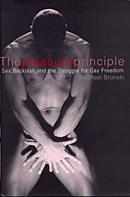
Gay/Lesbian/Feminist Bookstores Around the Country
The Mostly Unfabulous Homepage of Ethan Green
![]()


Pleasure Wars
Michael Bronski on Writing The Pleasure Principle
Over the past three decades I have been a cultural critic, which on the face of it seems a pleasant enough job. I read books, watch television, go to movies, attend the theater, and then write down my opinions. While I often address the usual questions critics ask was the acting good? did the plot make sense? was it well written? these often seem beside the point. When I begin writing or thinking about what I have experienced, the two questions I ask reflexively myself are "did this bring me pleasure?" and "what does this mean?" Almost all of my writing emanates from the desire to explain to myself why I liked something and what it means in a broader social context.
During the thirty years that I have written about culture I have also been a gay activist and organizer, helping to bring gay and lesbian culture and politics to the forefront of public life. At first these two vocations seemed quite separate, but the more I consumed culture, wrote criticism, and worked on politics I began to see that they were much closer than I had imagined. In the United States today culture and politics -- especially around issues of gayness and gender -- are inextricable intertwined. On the most obvious level it is why Jesse Helms and his friends attacked the National Endowment for the Arts for their funding of Robert Mapplethorpe's homoerotic photography and gay performance artists like Tim Miller and Holly Hughes. Less obviously and highly ironically it is why musicals like La Cage aux Folles and movies like To Wong Foo, With Love, Julie Newmar can be hugely popular during a time when right-wing attacks on gay rights and gay people are escalating.
It is no surprise that during this time conservative attacks on Hollywood, the media, and the Internet were also on the rise. This led me to speculate on the connections in the mainstream mind between homosexuality and culture, between politics and pleasure?
While I began writing The Pleasure Principle to explore this to explain it to myself I soon discovered that the links between gayness, popular culture, and politics were far deeper and more complex than I had at first imagined. The more I read and wrote I came to the realization that political and social attacks on gay people while unjust and dangerous were part of a larger cultural war; a war that was between that part of society that valued pleasure and sexuality, and the part that felt the need to suppress and control it. This is a war that has raged within Western culture for centuries. We see its in battles over censorship, over the rights of women to control their own lives and bodies, in the "sexual revolution,"and in the struggle for gay people to lead full and open lives including sexual freedom.
What I learned from writing The Pleasure Principle is that popular culture is often the embodiment and the central form that pleasure takes in everyday life and as such as a threat to those people in power who have made it their job to regulated and control pleasure and sex. More important, I also discovered that our desire and quest for pleasure in particular sexual pleasure is at the root of our desire for personal and social freedom and that freedom without pleasure is no freedom at all.
More from The Pleasure Principle:
- Introduction: Attacks on popular culture have everything to do with the modern gay rights movement.
- Suffer the Little Children: Pee-Wee Herman made so many adults uncomfortable, they were glad when his creator was arrested.
- The Eroticized Male Body: With the rise of gay culture came the idea that men could be sexy too.
- The Gay Ghetto and the Idea of Culture: Visibility leads to freedom, but it also leads to backlash.

 Back
to the Stonewall Inn
Back
to the Stonewall Inn